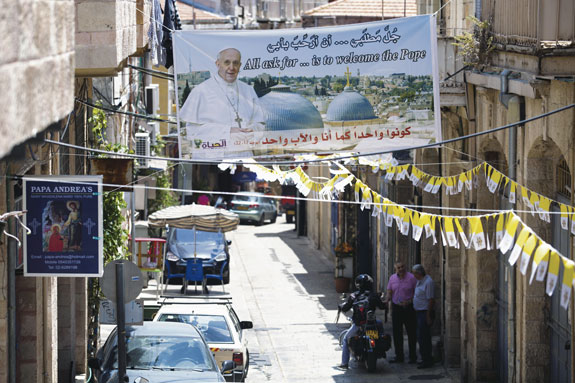by Judith Sudilovsky

JERUSALEM (CNS) – Many Jews in Jerusalem said while Pope Francis’ visit to their city was a positive thing, they wished their daily commute did not have to be disrupted so drastically.
Three hospital workers running to catch their bus said the papal visit was good, but because of traffic disruptions, they were going to be late for work. Actually, called one over her shoulder, she would have liked to have seen the pope in person.
“The pope can do whatever he wants but he is disturbing all our transportation,” said Malka Levine, 29, an Orthodox Jew who was waiting for the bus to take her home after the pope had left her neighborhood area next to Yad Vashem May 26.
“I have nothing against the pope, but other heads of state have come here, and I don’t remember anything being so extreme.”
She also said she did not agree with some of the measures taken for the pope’s visit, such as taking down the Israeli flags in front of the Western Wall.
Israel police had been on high alert, and some 9,000 police posted throughout the city following anti-Christian vandalism and provocation just days before the pope’s visit. Most of the trouble surrounded the issue of the Cenacle on Mount Zion, where the pope celebrated Mass with the Ordinaries of the Holy Land.
Just weeks before the papal visit, Orthodox Jewish extremists began a campaign charging that Israel was about to turn over the Cenacle to the Vatican, which Israel has denied. Jewish ultra-Orthodox newspapers proclaimed that Israel was handing over sovereignty of the structure to the Catholic Church and said the Vatican was about to move its headquarters to Mount Zion, despite the fact that Jews and Muslims also consider the site sacred.
Police also put several Jewish extremists under house arrest for the pope’s visit, and police helicopters flew over the city.
Israeli television dedicated special broadcasts to the pope’s visit, including interviews with scholars and commentators about the Catholic Church, Christianity, Israeli-Vatican relations and the pope.
Guy Abramovsky, 24, said that as a religious Jew, he viewed the pope’s visit as important for Israel.
“It shows that he has some connection and is trying to strengthen those connections to Judaism. It is important that everyone have their own beliefs, but that we understand each other,” he said. “So we have traffic jams for a day, but we can deal with it.”
Michael Stroke, 30, said he thought the visit had more political aims rather than the stated religious purpose.
“I’m neutral, either way,” said Stroke, an Orthodox Jew. “I’m not even following it. It is clear there is a religious aspect to it, but I think it has more to do with politics.”
Smoking a cigarette as she waited for a bus with friends, Samar Michael, 22, said the pope was a “righteous man.”
